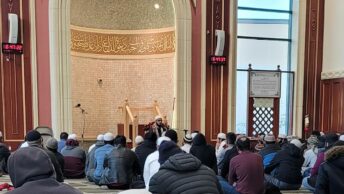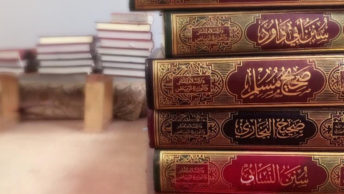With the name of Allāh, the All-Merciful, the Very-Merciful. All praise is for Allāh, Lord of the worlds; and peace and blessings be on our master Muhammad, his family and Companions.
Allāh Most High has blessed my dear and beloved teacher Shaykh al-Islām Mufti Muhammad Taqi Usmani (may Allāh protect him) with remarkable success and blessings (baraka) in all his various activities, works and services for the dīn. Whether it is teaching, writing on technical and challenging subjects or dealing with problems facing the umma, it seems he is divinely guided (mu’ayyad min Allāh) and granted special inspiration (mu’waffaq) by Allāh Most High.
A number of reasons can be highlighted behind this success such as his academic brilliance, intelligence, determination, hard work, valuing time, piety and turning to Allāh. However, one reason really stands out for me, which – especially in our times of individualistic tendencies – serves as a great lesson for students of knowledge like myself.
Studying the Shaykh’s life closely, one can see that most works that he carries out are upon the request – and often insistence – of his seniors/teachers, peers and even juniors. He never considers himself worthy of assuming any position or fit to take up a particular role. He is far away from desiring lofty positions, and never presents himself as a worthy candidate for a leading role. He often quotes his elders that one should not ask to be given a particular position or role, but when one’s seniors assign a task, one may consider it as a good omen and accept it. This way, one will be granted blessings and assisted by Allāh in the given task.
This approach is actually based on a prophetic ḥadīth. The Messenger of Allāh (peace and blessings be upon him) said, “Do not ask for leadership; for if you are given it due to your request, it will be left for you to deal with, but if you are given it without having requested it, you will be aided in it [by Allāh]…” (Bukhārī and Muslim).
Let us look at some examples from the Shaykh’s life in this regard:
1) Translating the Noble Qur’ān
The respected Shaykh has translated the Qur’ān in Urdu and English – both with explanatory notes. In the introduction to his Urdu translation, titled “Asān tarjama Qur’ān tashrihāt ke sāth” (Simple translation of the Qur’ān with explanatory notes), he writes:
“Until a few years back, I felt there were ample translations of reliable scholars in the Urdu language that there is no need for a fresh translation. Therefore, when people would request me to translate the Qur’ān – despite considering this service as a great honour – firstly the realization of my incapability would become a barrier, and secondly I did not feel that there was a need for a new translation. However, people from various circles expressed that available, reliable Urdu translations are now beyond the scope of general Muslims [due to the old language style], and thus there is a genuine need for a simple translation which can be understood by non-academics. This demand was made so excessively that I analysed the current translations, and felt these people had a point. Thereafter, when my English translation was published, the demand intensified even further. As such, I began the translation in the name of Allāh…”
He further states, “I am presenting this service (khidma) of [translating] the Noble Qur’ān with the realization that I do not possess the knowledge (ilm) and piety (taqwa) required for translating this unparalleled speech (kalam). However, the Generous Lord whose speech this is, can take whatever work He wants from any insignificant being…”
The above passages from his introduction clearly indicate that the Shaykh (may Allah protect him) did not feel worthy or qualified to take on this great task of translating the Noble Qur’ān. However, due to excessive demand from various people – which most likely included scholars – he felt there was a need and thus embarked on the work but still not considering himself worthy of the task at hand.
2) Teaching Ḥadīth
a) The respected Shaykh has been involved in teaching ḥadīth at Darul Uloom in Karachi (Pakistan) for the past fifty years or so. He initially taught Sunan al-Tirmidhī for approximately thirty years and later Ṣaḥīḥ al-Bukhārī, which he continues to do so. His lectures on Sunan al-Tirmidhī have been recorded and published titled “Dars Tirmidhī” in 3 volumes and the later chapters titled “Taqrir Tirmidhī” in two volumes. His lectures on Ṣaḥīḥ al-Bukhārī are also published in approximately 9 volumes titled “In’am al-Bari.”
He writes in the introduction to Dars Tirmidhī in relation to both him undertaking the role of teaching ḥadīth as well as the publication of his lectures/commentary:
“For the past ten years or so [this was written in 1400AH/1980AD), I have been given the task to teach Jami’ al-Tirmidhī. I have always felt that I do not possess the academic (ilmi) and spiritual (amali) capabilities required to teach ḥadīth, and in no way worthy of accepting the responsibility of teaching ḥadīth. However, given that this teaching seat/post was assigned to me by my seniors, I regarded compliance as a good omen for the future, and thus accepted this service which is still ongoing. In the beginning – whilst trembling due to the full realization of my incompetence – when I started teaching ḥadīth, I never imagined in my wildest dreams that I would agree for my ḥadīth lectures to be compiled and published. The publication of such lectures only befits those who are actually worthy of it; who am I, and what are my lectures that they should be published?” (Dars Tirmidhī 1/2)
The above quote informs us of two things: Firstly, Mufti Taqi Usmani (may Allah protect him) did not see himself as worthy of taking the post of teaching a major ḥadīth work in Darul Uloom Karachi. However, when his seniors instructed and assigned this task to him, he reluctantly accepted it. The baraka of this can be attested by the thousands of students who have studied ḥadīth – and in particular Sunan al-Tirmidhī – by him. His lectures are not mere customary lessons; rather, they combine knowledge (ilm), deep understanding (tafaqquh), wisdom and balance (hikma), spiritualty (tazkiya), insight into current affairs and reflection of the true understanding of religion, Al-Hamdulillah.
Secondly, the Shaykh also did not feel worthy of his lectures being published. After the above-quoted passage from Dars Tirmidhī, he outlines the reason behind him agreeing to the publication of his lectures on Sunan Tirmidhī. He explains that it was merely upon the insistence of the students who expressed a desire to have the lectures recorded and secured, so that they and students of the subsequent years can benefit from them easily. Those who have had the opportunity of studying the dars nizami course will attest to the value of Mufti Taqi Usmani’s Dars Tirmidhī. Thousands of students across the Indian Subcontinent and beyond have benefited, and continue to benefit, for these lectures. In fact, many teachers who currently teach Sunan Tirmidhī use his Dars Tirmidhī as one of the sources in preparation for their teaching. Yet, this is a work that the Shaykh did not feel comfortable with its publication, saying “who am I, and what are my lectures that they should be published?” and only agreed for the publication upon the insistence and request of his students.
b) In 1999, the teacher of Ṣaḥīḥ al-Bukhārī at Darul Uloom Karachi Shaykh al-Ḥadīth Mawlana Sahban Mahmud (may Allāh have mercy on him) passed away. Not only was he a teacher of ḥadīth for many years, he was in charge of academic affairs at the said institute. He was also a teacher of Mufti Taqi Usmani and the one who gave him the title of “Shaykh al-Islām.” After his passing, none of the senior teachers were prepared to take the mantle of teaching Ṣaḥīḥ al-Bukahri; each one of them considering themselves as unworthy and others as more worthy. Finally, all the senior teachers – including Shaykh Mufti Rafi’ Usmani (may Allah protect him), the elder brother of Mufti Taqi – insisted that the role be taken by Mufti Taqi Usmani which he reluctantly accepted. In this regard, he writes in the introduction to his lecture collection on Ṣaḥīḥ al-Bukhārī:
“On Saturday 29 Dhu’l Hijjah, 1419AH, my respected teacher Hadhrat Mawlana Sahban Mahmud (may Allāh sanctify his secret) passed away; the incident proved as a great tragedy for Darul Uloom Karachi. Along with many other issues, the issue of who should teach Ṣaḥīḥ al-Bukhārī – which the Shaykh had been teaching for many years – arose. It was finally decided that I should be given this responsibility. When I thought of the heavy responsibility, it seemed like a mountain. What association is there between this radiant book of Imām Bukhārī and a person like me who lacks knowledge and practice? By any stretch of the imagination, I could not see myself competent enough to teach Ṣaḥīḥ al-Bukhārī. However, I remembered what I had heard from my elders that when one is commanded by seniors to carry out a responsibility, then Allāh Most High grants ability/blessings (tawfiq). As such, with reliance on Allāh Most High, I commenced this teaching post.” (In’am al-Bari 1/3)
The above quotation once again demonstrates the Shaykh’s reluctance, this time in relation to taking up the post of teaching Ṣaḥīḥ al-Bukhārī, and only after the command of those whom he regarded as seniors did he accept. As such, since 1999 till today, he has been teaching “the most authentic book after the book of Allāh’ at Darul Uloom Karachi. As mentioned previously, his lectures on Ṣaḥīḥ al-Bukhārī have also been published in approximately nine volumes. This was also upon the request of his juniors – namely: Mawlana Anwar Hussein, who compiled the discourses – and the Shaykh granted permission for publication for the benefit of students.
3) Commentary on Ṣaḥīḥ Muslim: Takmilat Fath al-Mulhim
Perhaps Shaykh al-Islām Mufti Muhammad Taqi Usmani’s greatest and most important work is his monumental Arabic commentary on Imām Muslim’s Ṣaḥīḥ, tilted Takmilat Fath al-Mulhim. This six volume work, in which he completed the earlier commentary of Allama Shabbir Ahmad Usmani (may Allah have mercy on him), attained recognition of scholars and students of knowledge from around the world. One merely has to see the words of praise and approval from great luminaries such as Shaykh Abdul-Fattah Abu Ghudda, Shaykh Abu ‘l-Hasan Ali Nadwi and Shaykh Yusuf al-Qaradawi to realize its greatness. Shaykh Yusuf al-Qaradawi (may Allāh preserve him) states regarding this commentary, “I have found in this commentary the touch of a muhaddith, competency of a jurist (faqīh), astuteness of a teacher, forbearance of a judge and insight of a contemporary scholar – side by side.” The work can be considered as one of the most important ḥadīth commentaries due to its extensive explanation of numerous contemporary issues with great mastery and authority while commenting upon the ḥadīths.
This work too was upon the instruction of his seniors, namely his father Shaykh Mawlana Mufti Muhammad Shafi’ (may Allāh have mercy on him). Mufti Taqi Usmani himself explains in his introduction of this work that his late father was very passionate about the original commentary of Shaykh Shabbir Ahmad Usmani, and thus after the latter’s demise his father was eager for its completion. Due to his father being overwhelmed with various other activities and constant travels, he could not dedicate himself for this task. He requested many scholars of his era to take this work on, but to no avail. Finally, during the last year of his life, he instructed his son to complete this commentary. Shaykh Taqi mentions that he was reluctant to take on this monumental task due to considering himself as incompetent, but then agreed when his father encouraged and assured him that he would guide him and look over what he wrote. He thus began the work and would daily show his father what he had written, but his father left this world after only a few months. Initially he could not continue with the work due to the heartbreak he suffered from his father’s demise, but later decided to continue the work his father (may Allāh elevate his rank, Āmīn) had assigned to him during his life. The commentary was then completed in 18 years with the tawfiq of Allāh. (See: Introduction to Takmilat Fath al-Mulhim bi sharh Ṣaḥīḥ Muslim)
4) Judge at the Supreme Court of Pakistan
A unique feature of the constitutional framework of the Islāmic Republic of Pakistan is that any Pakistani citizen has a constitutional right to challenge any existing law before the Federal Shari’ah Court on the ground that it contradicts the teachings of the Qur’ān and Sunna. If the court agrees, it gives notice to the Government to make a change in the law. Any party – the Government or the petitioner – aggrieved at the decision of the Fedral Shari’ah Court can appeal the decision before the Shari’at Appellate Bench of the Supreme Court, and the judgement of the Supreme Court bench in this respect is final. Justice (RTD) Muhammad Taqi Usmani (may Allāh protect him) served as a judge first in the Federal Shari’ah Court of Pakistan and then at the Shari’at Appellate Bench of the Supreme Court of Pakistan from 1980 to 2002.
Although the right to challenge any “unIslāmic” law existed in the constitution of Pakistan from the outset, it was the late President of Pakistan General Zia ul Haq who facilitated its process by establishing the Federal Shari’ah Court and Shari’at Appellate Bench in the Supreme Court. Mufti Taqi (may Allāh protect him) explains in his “Nuqush Raftga” and other writings that the late President was determined to appoint him as a judge, but he categorically refused to accept the position despite realising the importance of scholars being part of the Shari’ah Court. There were many reasons for his reluctance such as having to sacrifice some of his teaching time at Darul Uloom Karachi and travelling to Islāmabad on a regular basis. He also had doubts whether taking up such a post was suitable for him or not from a religious perspective. However, President Zia ul Haq kept insisting and used the intermediary of Mufti Taqi Usmani’s Shaykh Dr Abdul Hayy Arifi (may Allāh have mercy on him). Upon the approval and blessing of his spiritual mentor Dr Arifi – and others such as Shaykh al-Ḥadīth Mawlana Muhammad Zakariyya (may Allāh have mercy on both) – he finally accepted the role. (Nuqushe Raftaga pp182 and 282)
Due to the blessings of his seniors, Allāh Most High granted him much success in his twenty year career of being a judge. He took part in many judgments, notebally: the historic judgement on interest. Many of Mufti Taqi Usmani’s judgments and court orders were later published in two volumes, titled “Adalati faysale.”
5) Legal Verdicts (fatawa)
Fiqh and fatwa have become synonymous with Shaykh Mufti Taqi Usmani’s name to the extent that a large section of the Muslim world consider his legal verdicts (fatawa) as the final word on any given matter. Growing up under the guidance of his illustrious father Mawlana Mufti Muhammad Shafi’ (Allāh have mercy on him) – the former Grand Mufti of Pakistan – his acquaintance with jurisprudence (fiqh) and fatwa was established from a very young age. To date, the respected Shaykh has penned thousands of fatawa – a substantial amount of which have been published in the (so far) four volume “Fatawa Usmani.”
In this regard too, his initiation of writing fatawa and the subsequent official role of “Mufti” was due to the instruction and guidance of his seniors and teachers. The Shaykh writes in the introduction to his Fatawa Usmani, “I would be apprehensive [during my adolescence] in providing anyone with a verbal or written answer, and during my study days at the Madrasa the thought did not even enter my mind that at some point the responsibly of issuing fatawa will fall onto me.” He thereafter explains how at the age of 15, when he was studying Al-Hidaya, his teacher Shaykh Mufti Wali Hasan Tonki (may Allāh have mercy on him) once handed him a simple question relating to “divorce” and asked him to write the answer. He was hesitant but his teacher encouraged him, and hence he wrote the answer and his teacher signed it off.
Thereafter, in 1958 whilst studying Mishkat al-Masabih, another teacher of his Shaykh Mufti Rashid Ahmad Ludhyanawi (may Allāh have mercy on him) encouraged and trained him to practice deriving rulings to questions from fiqh reference works. In the same year, upon the instruction and guidance of his father he compiled his first official fatwa on the subject of “offering night-vigil (tahajjud) prayers in congregation” – and he was only 16 years of age at the time! Later, he officially enrolled in the “takhassus fi ‘l-ifta” program and underwent training by his esteemed father. After graduation, along with teaching various books at Darul Uloom Karachi, he continued writing and issuing fatawa under the supervision of his father (may Allāh have mercy on his soul) and continues to do so till today. (Fatawa Usmani 1/33-340)
The above demonstrates that the Shaykh (may Allāh protect him) began issuing and writing fatawa from his very early days upon the instruction, guidance and practical training of his teachers – most notably his father. Why would Allāh Most High not grant so much tawfiq, blessing and benefit in the fatawa and fiqh works of someone who was tailor-made for this role by so many of his seniors?
6) Spiritual Discourses
The respected Shaykh has been delivering a weekly discourse (islahi majlis) since the late eighties/early nineties, initially taking place on Friday evenings at the Bayt al-Mukarram Mosque in Karachi and thereafter on Sunday evenings in Darul Uloom Karachi. These weekly talks are not mere customary lectures; rather, they provide detailed guidelines on every aspect of one’s life. It is difficult to describe in words the awesomeness and benefit of these discourses. They have literally changed the lives of thousands of people and provided much guidance in our times of confusion, Al-Hamdulillah. The discourses spanning over nearly three decades have been complied and published in over twenty volumes titled “Islahi Khutbat” and about ten of these have been translated into English under the title “Discourses on Islāmic Way of Life.”
Once again, these weekly discourses were initiated upon the instruction of his seniors, as outlined by the respected Shaykh in the introduction of Islahi Khutbat. He states: “In compliance with the instruction of my elders/seniors [such as his teacher Shaykh al-Ḥadīth Mawlana Sahban Mahmud and others], for the past many years I have been imparting some words of dīn on Fridays after Asr prayer at the Bayt al-Mukarram Mosque. Men and women from all walks of life attend this gathering, and by the grace of Allāh I and the listeners feel the benefit of these gatherings. May Allāh make them a means of our rectification, Āmīn.”
7) Autobiography
A few years ago, the respected Shaykh began compiling his autobiography, of which some sixteen episodes have been published in Darul Uloom Karachi’s monthly journal “Al-Balagh.” Those who have had an opportunity to read some or all of the episodes thus far will know the importance of his autobiography and the life-lessons one can attain from them. This initiative was also a result of the request, rather insistence, of many scholars and avid followers of the Shaykh. Mufti Taqi Usmani (may Allāh protect him) himself explains the background and context of him deciding to write his autobiography. He writes:
“Many friends and well-wishers of mine, after reading my travelogues, have been requesting me that I should write an autobiography. However, I always considered this request as a consequence of their love and thus never took it seriously because I used to think that biographies are only written of major personalities in whose lives there are lessons for others. How would a biography of someone like me, who looks at his previous life and sees nothing but regret and shame, benefit anyone?
Three years ago, a much respected senior figure for me and the head Mufti of Dar al-Uloom in Dhabhel (India) Hadhrat Mawlana Mufti Ahmad Khanpuri (whose services for the dīn are spread all over India and various other parts of the world) made the same request in the sacred ḥaram, and I responded with the same excuse. However, the respected Mufti (may Allāh preserve him), after returning to Dhabhel, wrote a detailed letter in which he repeated the directive in full seriousness and with due vigilance – not only from himself but also on behalf of many other scholars.” (Al-Balagh journal)
Thereafter, Mufti Taqi Usmani reproduced the full letter of Shaykh Mufti Ahmad Khanpuri (may Allāh preserve them both) and their dialogue verbatim. Shaykh Khanpuri pleads for an autobiography to be written citing, amongst other things, examples of earlier scholars who also compiled their autobiographies. In response, Shaykh Taqi outlines that many people previously have made the same request but he strongly refused for two reasons: First, he does not feel worthy of writing his personal life-memoirs saying “what benefit will the autobiography of a fly or mosquito give to others?”, and secondly he wants to dedicate the remainder of his life to other important works and is thus unsure if the time should be spent in writing an autobiography. However, he says in his reply letter, after reading the points raised by Shaykh Khanpuri and the manner in which he wrote the letter, he has given the suggestion some serious thought for the first time.
Finally, he agrees to start writing his autobiography, and – in order to address the abovementioned two problems – he took two things into consideration: In relation to not feeling worthy, he still feels the same but since many people have written his biography in Arabic and Urdu and often exaggerated in their praise and at times unaware of the full context of events, it may be appropriate for him to write an autobiography to “put the record straight.” Secondly, in relation to time and the other important works which he intends to undertake, he decided that the autobiography will only be written during his various travels and journeys. (Al-Balagh journal, Muharram 1439 edition)
Al-hamdulliah, at the time of writing this article some sixteen episodes of his autobiography have been released and many already translated into English. It is more than just an autobiography, and people from all walks of life are benefitting from the amplitude of lessons and events mentioned therein. This work too was initiated upon the request and insistence of many people and in particular Shaykh Mufti Ahmad Khanpuri (may Allāh preserve him).
The above are just seven of many examples from the works and services of Shaykh al-Islām Mufti Muhammad Taqi Usmani (may Allāh protect him). Here is an individual blessed with intelligence, academic brilliance, deep knowledge, insight and piety, yet most if not all of his works and services are inspired with the instruction, guidance and blessings of his seniors, and sometimes peers and juniors. Why would Allāh Most High not grant so much success and baraka in his works?
Contrast this to the common attitude of our times, where often people consider themselves more worthy than others for certain positions, roles and tasks. It sometimes seems that we consider ourselves as experts and important, and that our opinion must hold great value in the eyes of the people. Sadly, this sometimes results in power struggle, infighting and vying for leadership roles.
Social media has taken it to a whole new level, such that everyone is now important and has an audience. From facebook and twitter accounts to blogs, vlogs and YouTube channels, everyone wants their opinion to be heard and accepted – without considering whether one is actually worthy and capable or not. The Messenger of Allāh (peace and blessings be upon him) forecasted this as one of the signs before the final hour; he said: “When you see greed being obeyed, desires being followed, this world preferred [over the next], and each person being deluded by his own opinions, then take care of yourself and leave the common people.” (Tirmidhī and Abu Dāwūd)
As such, the way of our predecessors (salaf) was to always remain humble and know their limits. The examples cited from the life of Shaykh Taqi Usmani (may Allāh protect him) serve as great lessons for everyone and in particular students of sacred knowledge like myself. May Allāh allow us to follow in his footsteps and the footsteps of all the great personalities whom Allāh accepted for the service of his dīn, Āmīn.
Muhammad ibn Adam
Leicester, UK
09/04/2019






